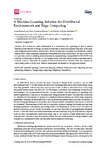A Machine Learning Solution for Distributed Environments and Edge Computing

Use este enlace para citar
http://hdl.handle.net/2183/23921
A non ser que se indique outra cousa, a licenza do ítem descríbese como Atribución 4.0 Internacional (CC BY 4.0)
Coleccións
- Investigación (FIC) [1678]
Metadatos
Mostrar o rexistro completo do ítemTítulo
A Machine Learning Solution for Distributed Environments and Edge ComputingData
2019-08-09Cita bibliográfica
Penas-Noce, J.; Fontenla-Romero, Ó.; Guijarro-Berdiñas, B. A Machine Learning Solution for Distributed Environments and Edge Computing. Proceedings 2019, 21, 47. https://doi.org/10.3390/proceedings2019021047
Resumo
[Abstract] In a society in which information is a cornerstone the exploding of data is crucial. Thinking of the Internet of Things, we need systems able to learn from massive data and, at the same time, being inexpensive and of reduced size. Moreover, they should operate in a distributed manner making use of edge computing capabilities while preserving local data privacy. The aim of this work is to provide a solution offering all these features by implementing the algorithm LANN-DSVD over a cluster of Raspberry Pi devices. In this system, every node first learns locally a one-layer neural network. Later on, they share the weights of these local networks to combine them into a global net that is finally used at every node. Results demonstrate the benefits of the proposed system.
Palabras chave
Machine learning
Distributed learning
Artificial neural networks
Big Data
Privacy-preserving
Internet of things
Edge computing
Raspberry
TensorFlow
Distributed learning
Artificial neural networks
Big Data
Privacy-preserving
Internet of things
Edge computing
Raspberry
TensorFlow
Versión do editor
Dereitos
Atribución 4.0 Internacional (CC BY 4.0)
ISSN
2504-3900






